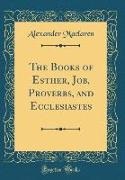Read more
Excerpt from The Books of Esther, Job, Proverbs, and Ecclesiastes
Haman was as superstitious as cruel, and so he sought for. Auguries from heaven for his hellish pur pose, and cast the lot to find the favourable day for bringing it about. He is not the only one who has sought divine approval for wicked public acts. Religion has been used to varnish many a crime, and Te Dewms sung for many a victory which was little better than Haman's plot.
The crafty denunciation of the Jews to the king is a good specimen of the way in which a despot is hood winked by his favourites, and made their tool. It was, no doubt, true that the Jews' laws were diverse from those of every people,' but it was not true that they did not keep the king's laws,' except in so far as these required worship of other gods. In all their long dis persion they have been remarkable for two things, their tenacious adherence to the Law, so far as possible in exile, and their obedience to the law of the country Of their sojourn. No doubt, the exiles in Persian territory presented the same characteristics. But Haman has had many followers in resenting the distinctiveness of the Jew, and charging on them crimes of which they were innocent. From Mordecai onwards it has been so, and Europe is to-day disgraced by a crusade against them less excusable than Haman's. Hatred still masks itself under the disguise of political expediency, and says, It is not for the king's profit to suffer them.'
About the Publisher
Forgotten Books publishes hundreds of thousands of rare and classic books. Find more at www.forgottenbooks.com
This book is a reproduction of an important historical work. Forgotten Books uses state-of-the-art technology to digitally reconstruct the work, preserving the original format whilst repairing imperfections present in the aged copy. In rare cases, an imperfection in the original, such as a blemish or missing page, may be replicated in our edition. We do, however, repair the vast majority of imperfections successfully; any imperfections that remain are intentionally left to preserve the state of such historical works.

